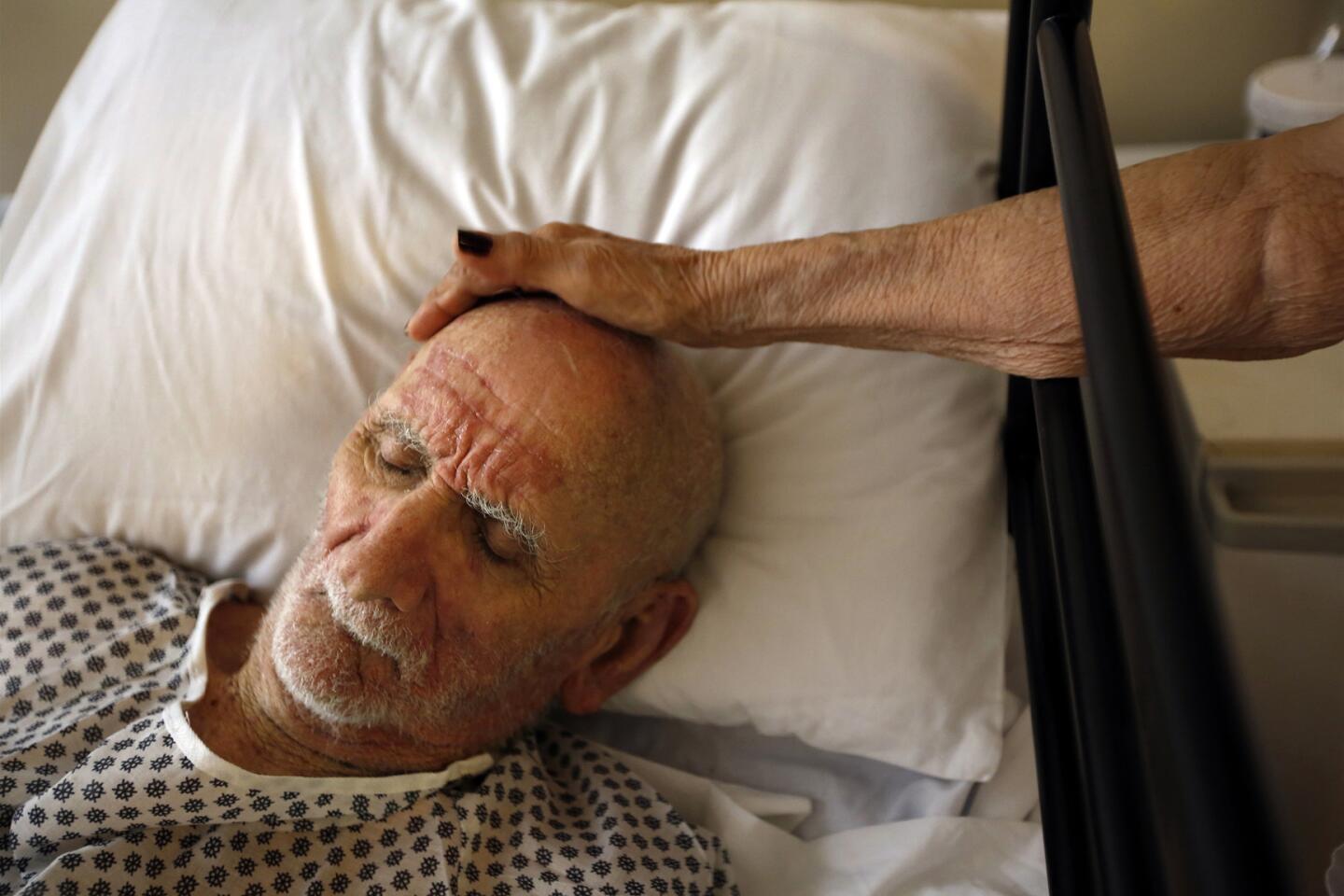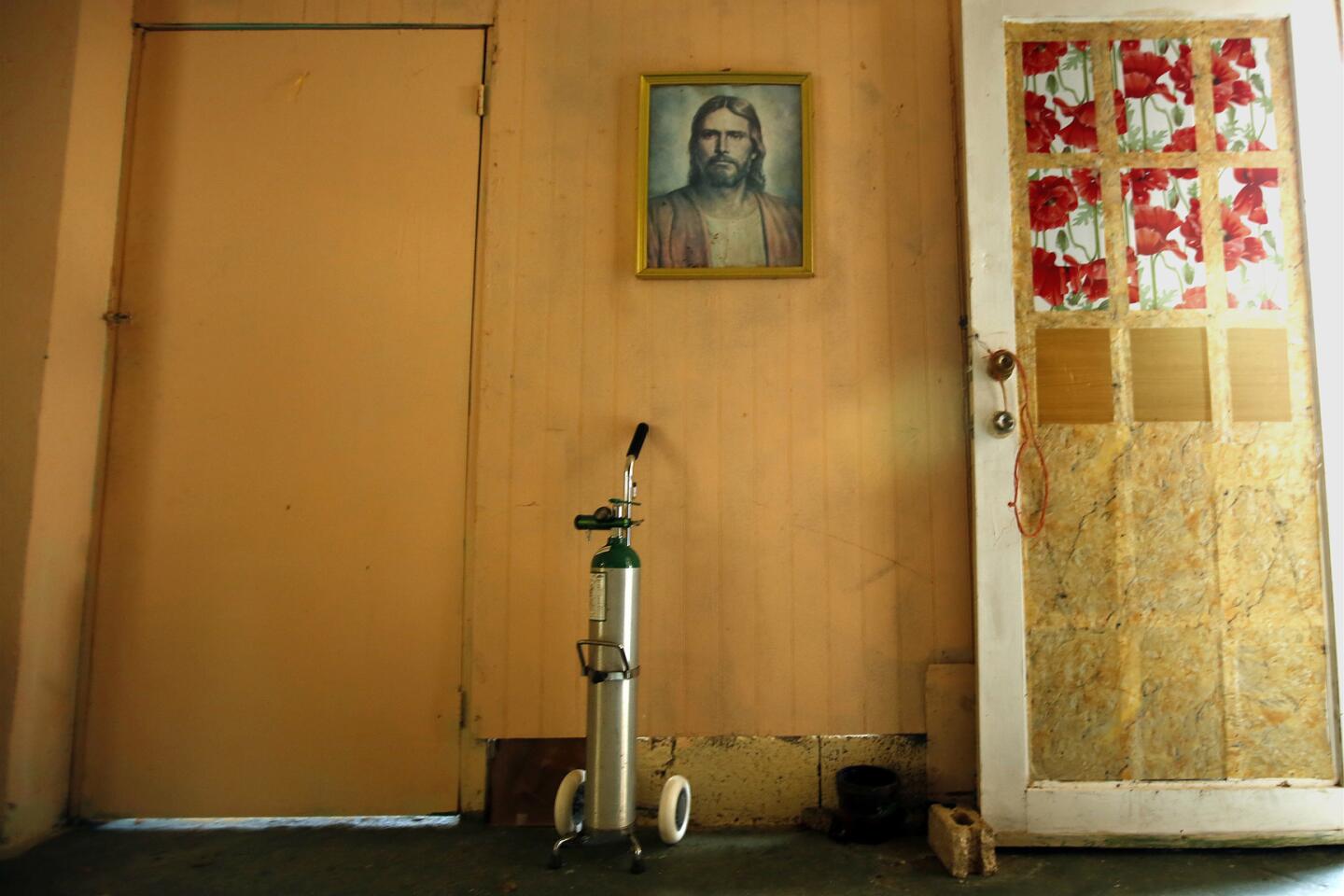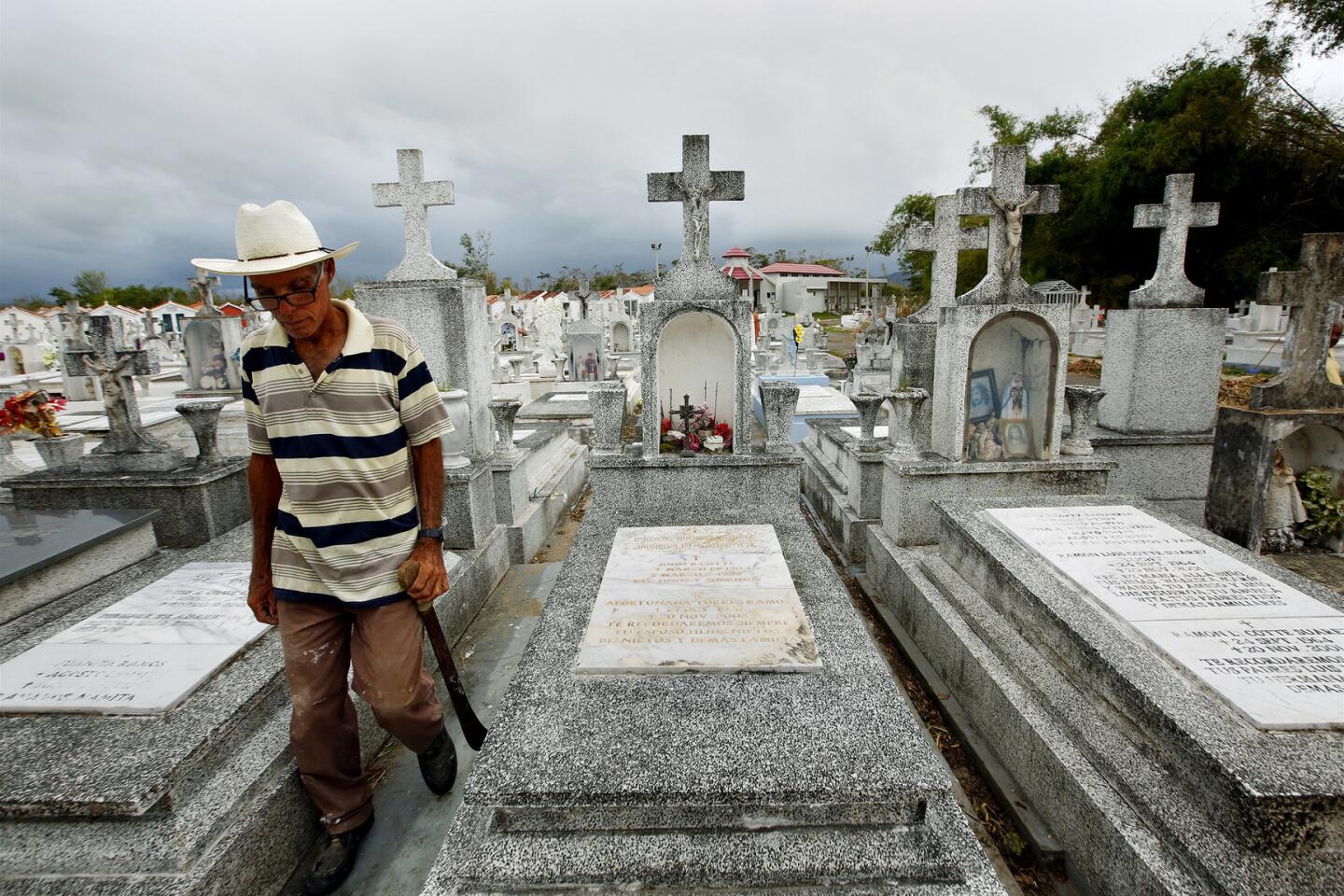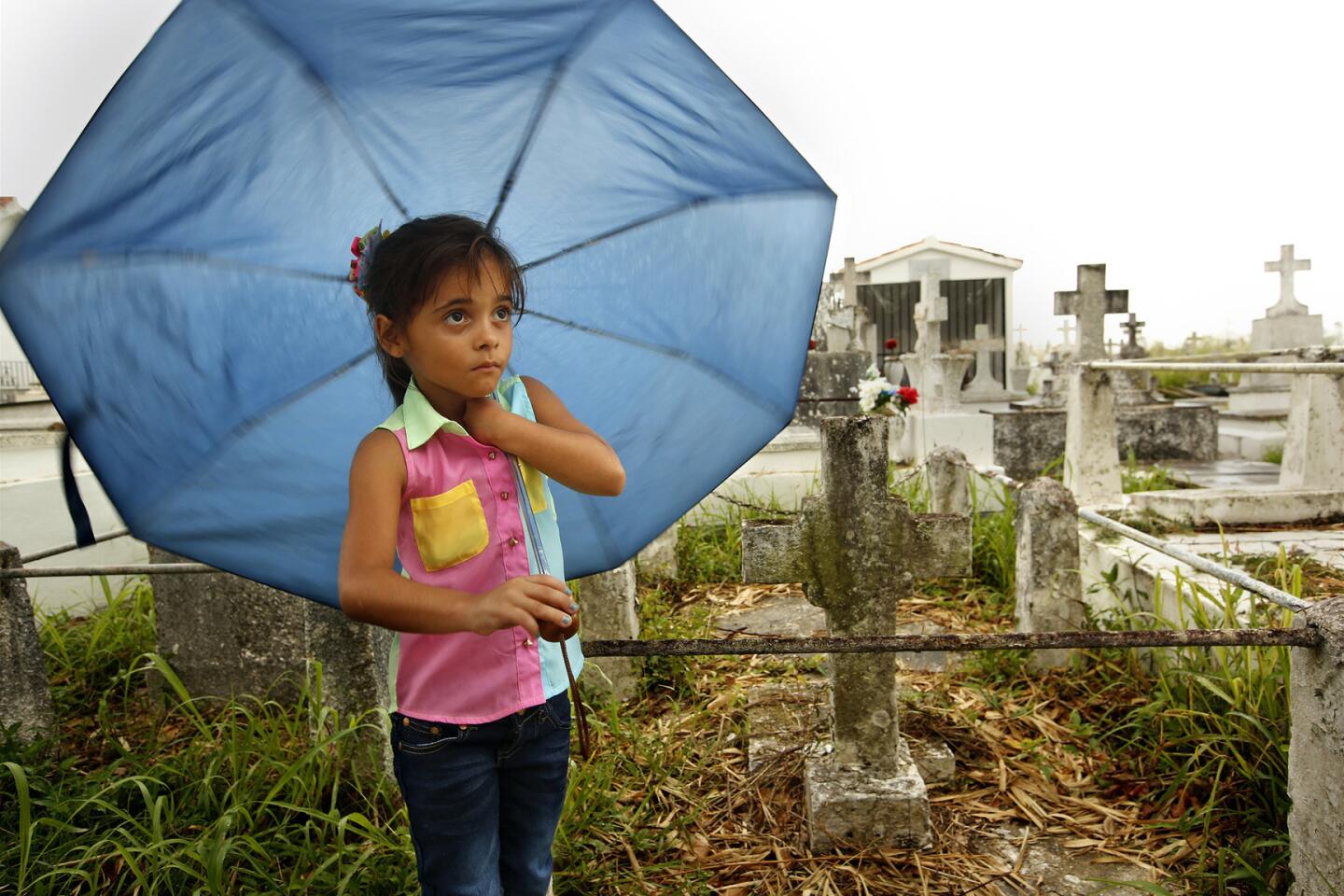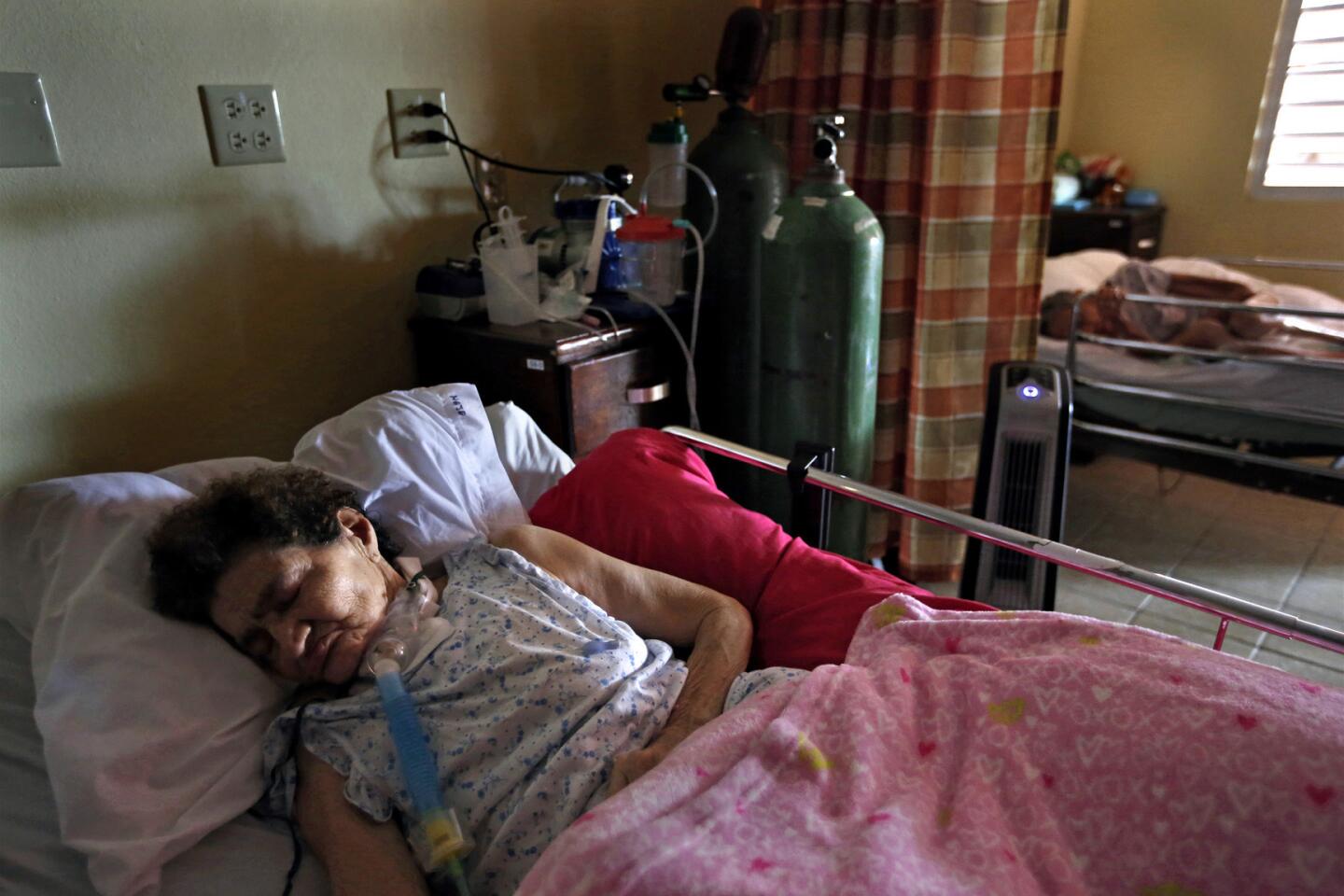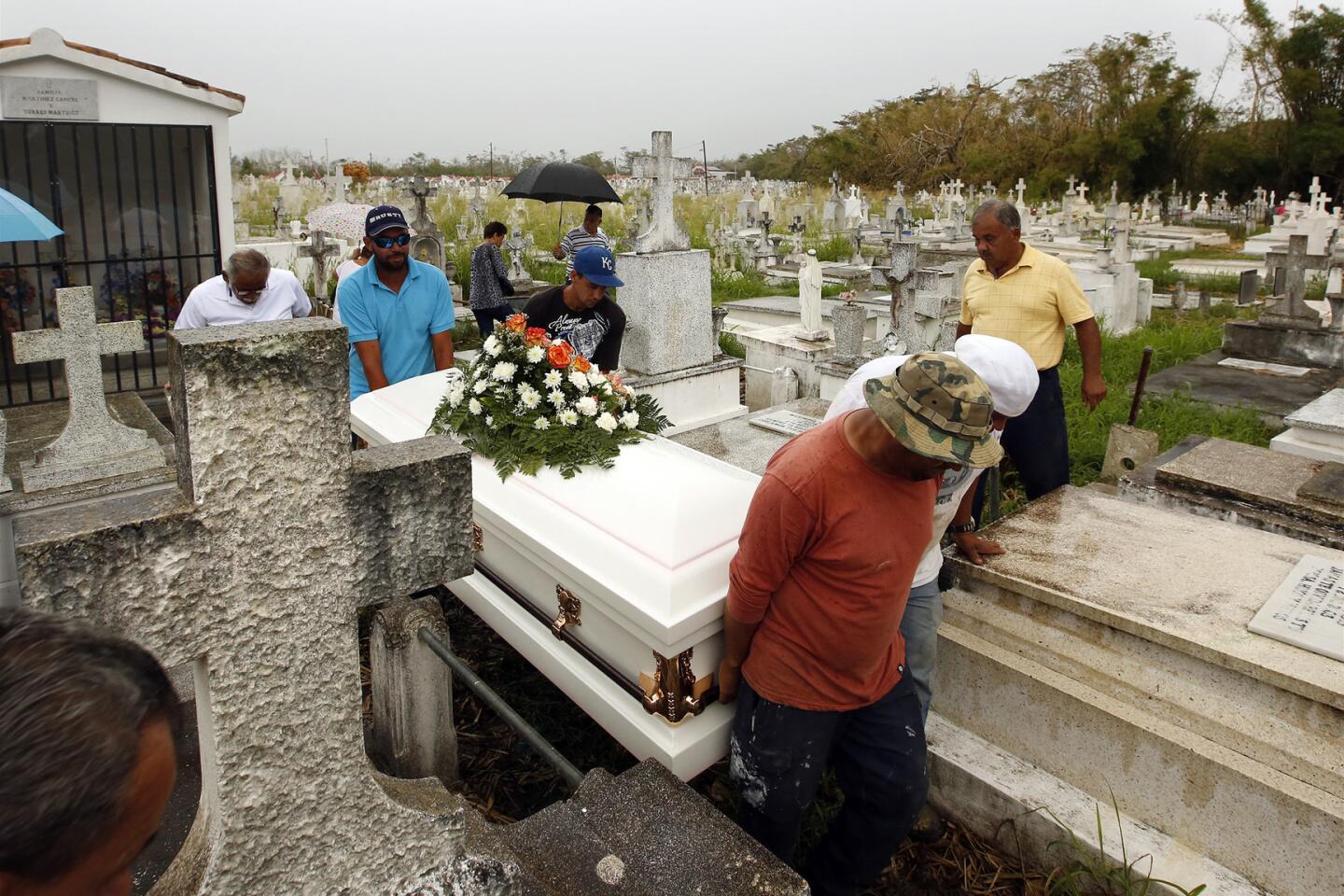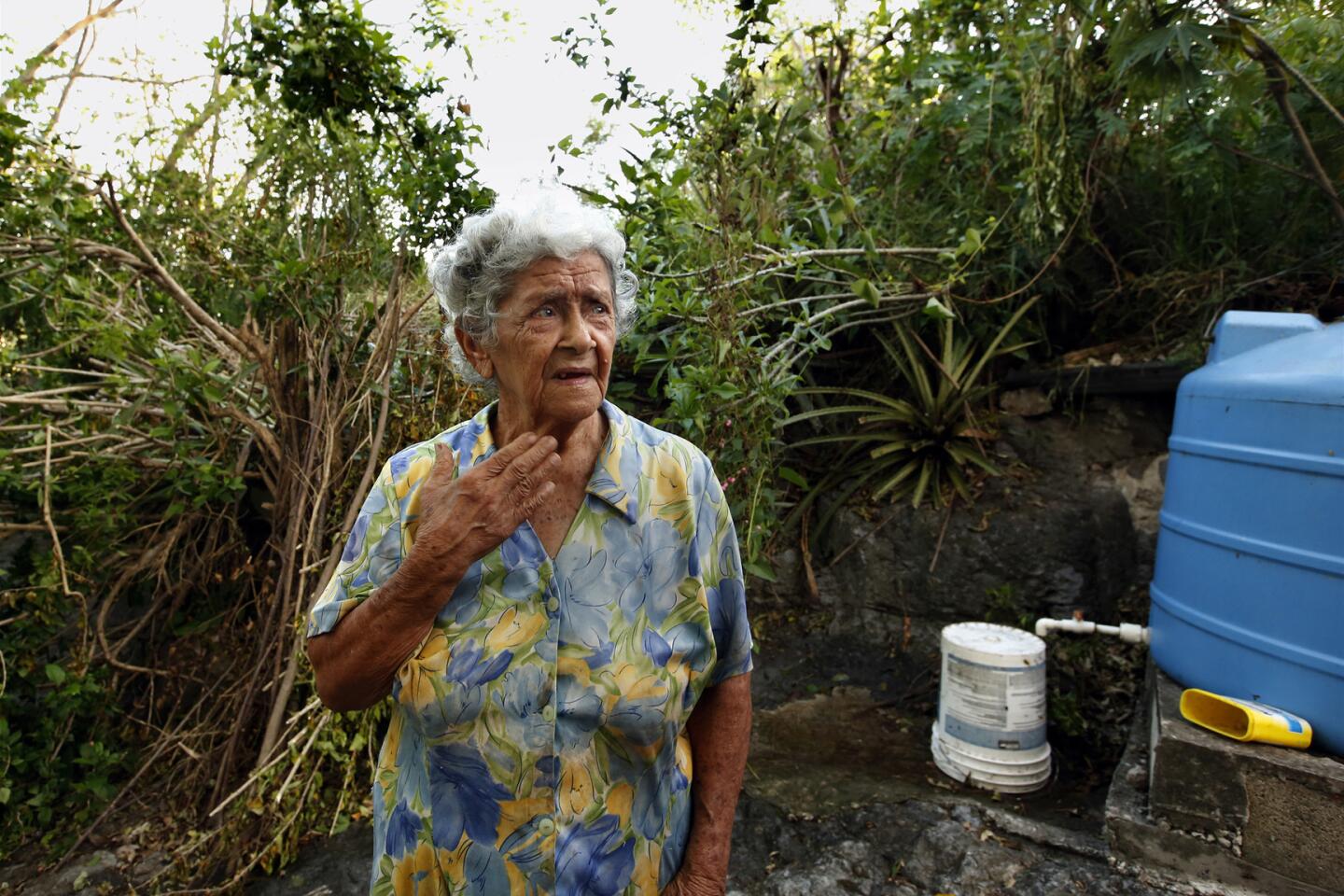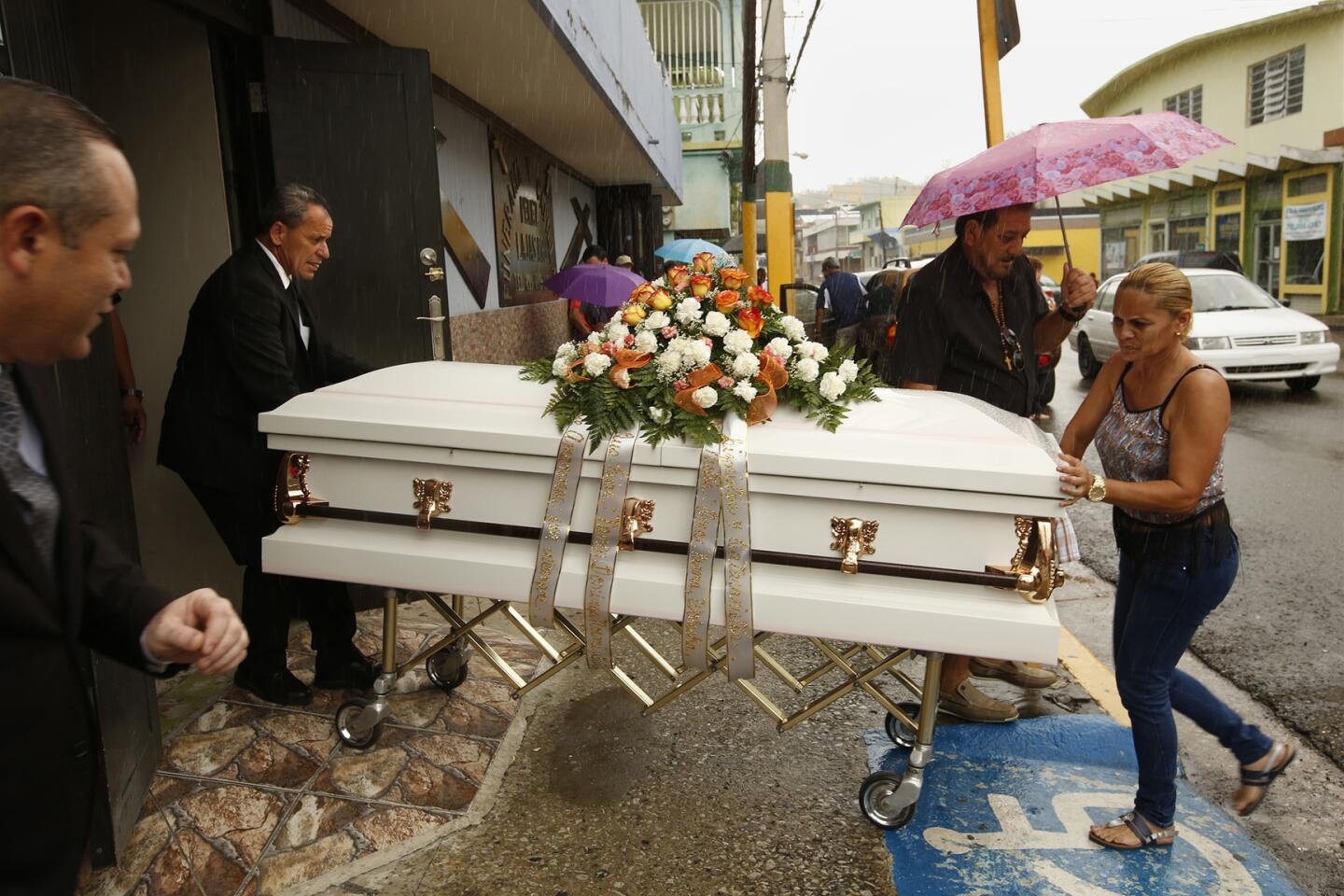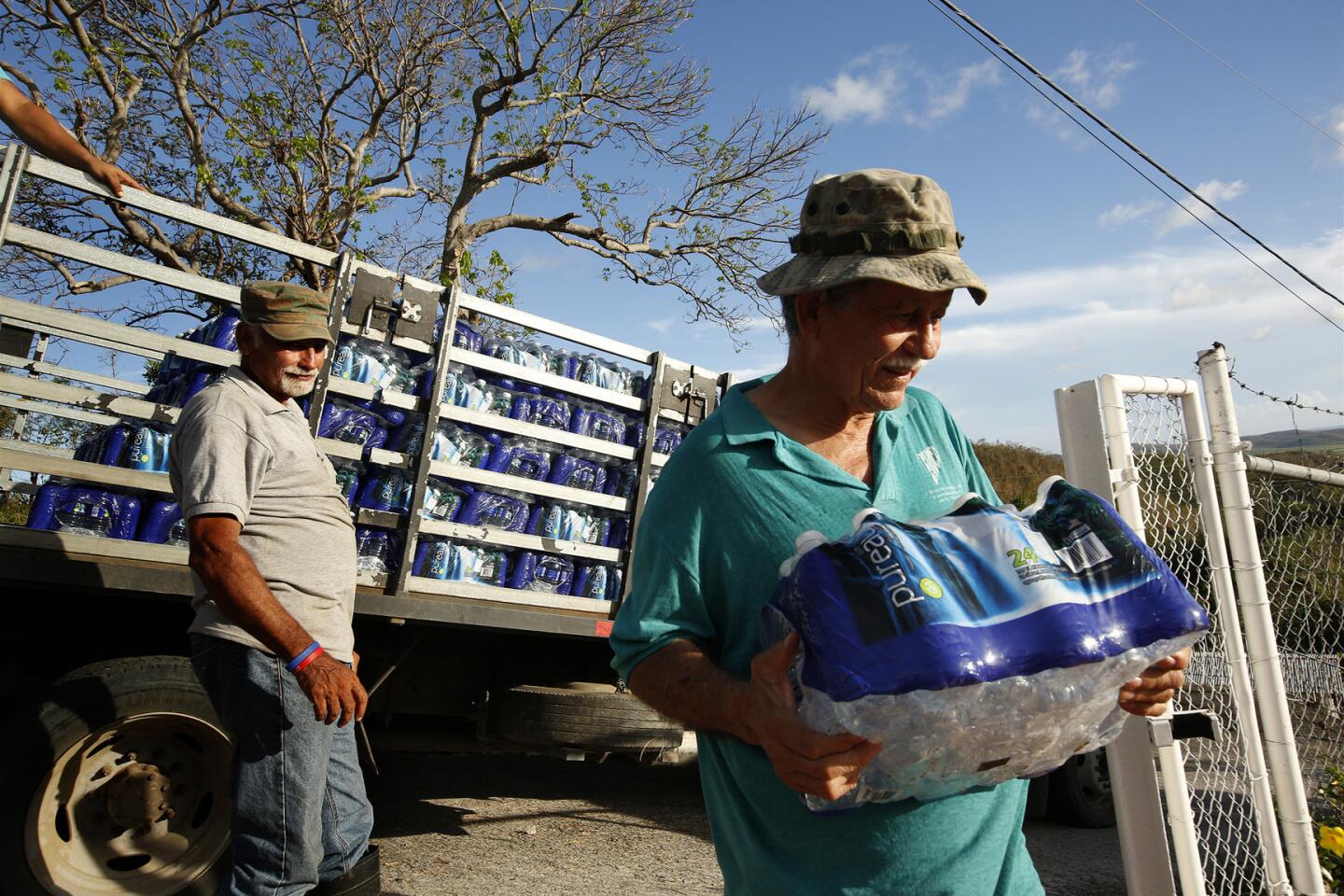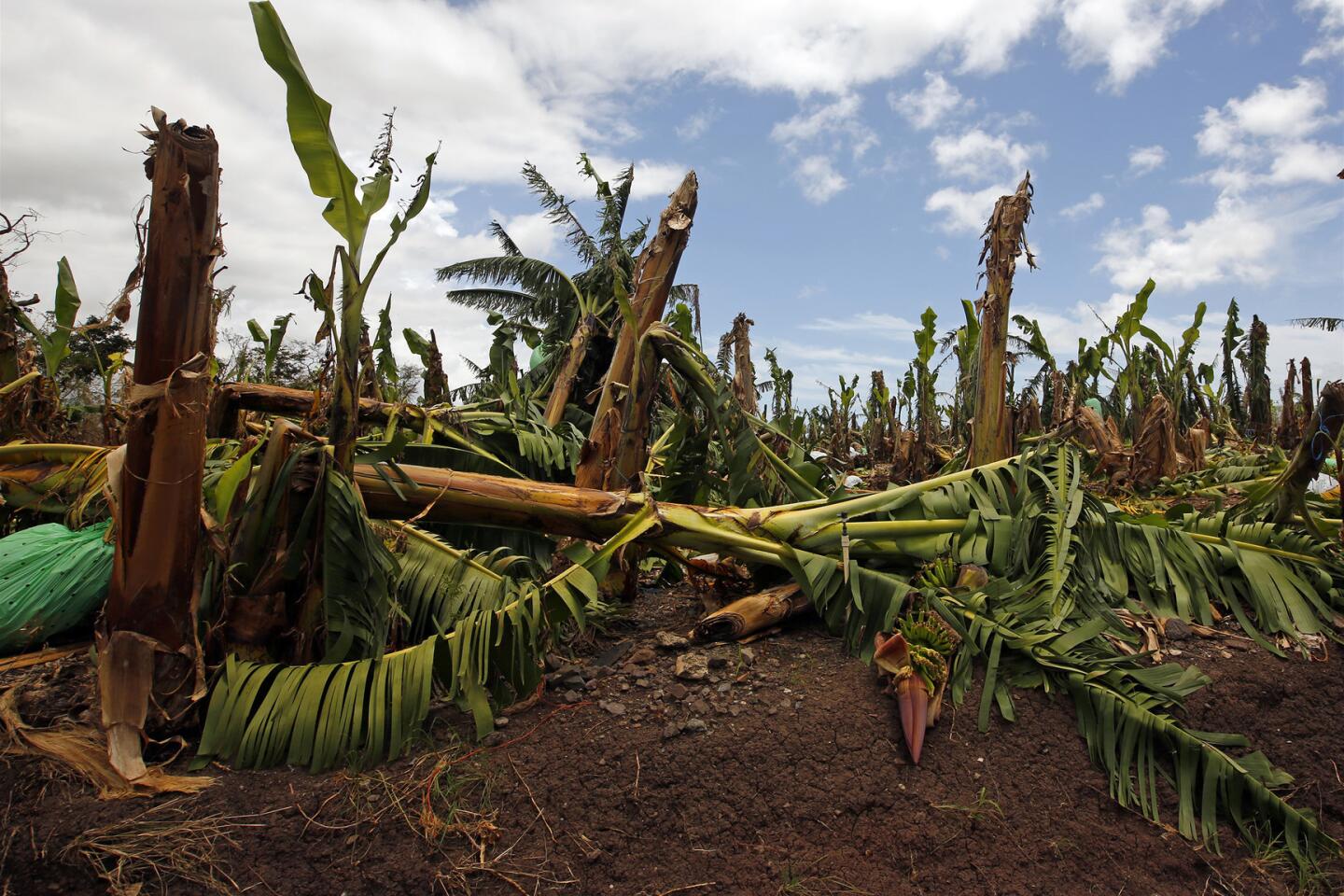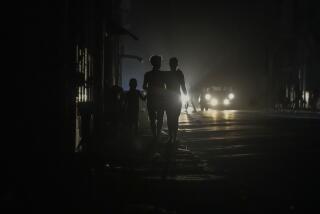In one Puerto Rican nursing home, a struggle to get power and keep patients alive
- Share via
Reporting from LAJAS, PUERTO RICO — Before Hurricane Maria struck, destroying their home and about 250 others in this southwestern coastal town, Heyda Ortiz thought she was protecting her elderly parents by bringing them to a shelter.
But last week, the shelter lost electricity, which her 84-year-old bedridden father, Eddie Ortiz — a U.S. Army veteran suffering from Alzheimer’s — needed to adjust his hospital bed and avoid ulcers. Another elderly man there died. A woman on a ventilator was transferred to a nursing home, but it had room for only her. The area still lacked cellphone service, so Ortiz could not call relatives for help.
“We had nowhere else to go,” said Ortiz’s mother, Antonia Morales.
After San Juan Mayor Carmen Yulin Cruz made an impassioned plea for immediate, lifesaving aid, President Trump responded with a series of tweets Saturday that praised Gov. Ricardo Rossello and recovery efforts and attacked Cruz, saying she was among those who “want everything to be done for them when it should be a community effort.”
But in places like rural, southwestern Lajas, known as an island within the island, locals said they are doing just that — helping each other. But there is only so much they can do.
Ortiz, unable to do more for her parents herself, turned to city officials, who found them a hotel room. There’s sporadic water and electricity and no phone. Their food comes from the shelter, which relies on shipments from the Federal Emergency Management Agency.
“We hope they will provide, little by little,” said Morales, 83.
Lajas Mayor Marcos Irizarry Pagán arranged for the family to stay at a hotel, along with another family of three, because he feared they couldn’t survive at the shelter.
“These are elderly people sick due to a lack of oxygen, diabetes — it’s a lot of complications and they can’t resist it. We want to help them, but our hands are tied,” he said.
FEMA sent its first shipment to Lajas on Friday. Police picked it up from a nearby city under guard, concerned about looting. The shipment contained 200 boxes of food and 786 24-packs of water for a town of 25,000.
“That’s not enough,” said Nasser Taha, the mayor’s legal advisor. “There is really a humanitarian crisis going on.”
The mayor was issued a satellite phone to contact FEMA in San Juan, but he said the agency never calls back. He has started using the phone to let residents call worried relatives on the U.S. mainland.
The mayor issued an order giving doctors and nurses priority in the lines at gas stations, but that doesn’t help much when the lines persist overnight, he said.
The town has one of the highest incidences of diabetes on the island, he said, and the insulin medication diabetics need to survive must be refrigerated.
When FEMA staff visited in recent days, the mayor asked why aid had been delayed and requested immediate help for those who need dialysis, insulin, oxygen and other treatments.
FEMA staff apologized, insisted the delay was not normal and assured city officials “that a barge was on the way,” Taha said. “We asked for a tank of oxygen. I cannot understand how it could take a week or two weeks to get a tank of oxygen.”
About 100 people died in the three days after the storm in the Lajas region, twice the typical rate, according to a local funeral director. Eight elderly people have died in Lajas since the storm, at least one directly related to a shortage of medical supplies.
“We don’t know if they didn’t have enough medicine, or oxygen — all of them were without electricity after the hurricane,” said funeral director Francisco Velez.
The one death that has been ruled storm-related was the former mayor’s 96-year-old father Hermenegildo Cotte Melendez, who died Monday after the town shelter where he had sought refuge lost electricity and his oxygen tank failed.
Leovigildo “Leo” Cotte Torres, 70, said emergency dispatchers initially refused to send his father to a hospital Sunday because they said none had oxygen. “The alternative was to take him to a shelter because there were generators there,” he said. But then the shelter generator failed.
The electricity was restored, but Cotte died a few hours later. He was buried Wednesday in the town cemetery. His empty $20 oxygen tank still sits in the family’s spare living room in the jungle hills above Lajas, under a portrait of Jesus.
Cotte’s family didn’t fault paramedics who they said tried to help by taking them to the shelter, or the mayor who they said tried to outfit the shelter as best he could. They faulted national leaders and emergency managers for not protecting some of society’s most vulnerable.
“People who are elderly have a right to live out their lives. They needed to be prepared,” said Charyleen Cotte, 43, as she sat with her father and friends outside his house Saturday. “Unfortunately, the decisions they are making are discriminating against the elderly who are bedridden.”
The shelter in Lajas is at an elementary school, where the elderly sleep on cots in open air rooms without air conditioning, electricity or, as of Saturday, running water and working bathrooms.
Among the evacuees was Victor Perez Zapata, a retired farmer who claimed to be 108. He was in good health and spirits, said wife Ada Montalvo Figueroa, 72, but she worried. At times, he has trouble breathing, and needs an oxygen tank. They had left it at home.
In a neighboring classroom, Juan Ortiz was watching over his 88-year-old father, retired sugar cane farmer Alejandro Ortiz Velez, who lay sleeping on a cot. On Friday they showered, preparing for days, maybe weeks without running water. Ortiz, 64, is diabetic, as is his neighbor, and after the shelter lost electricity they stored their insulin in a cooler.
“Yesterday my sister brought me ice, but we need more,” he said. “We don’t know what is going to happen. We’re waiting for the help. It’s like you’re in limbo.”
They lost their home in the storm, as did neighbor Antonio Soto Maldonado.
“They’re going to have to start school. Where are they going to put us?” said Soto, 68.
Also dependent on the shelter for food was a low-income senior apartment complex across town housing 117 people. They had lost electricity and running water by Saturday and were relying on a diesel-fueled generator, which they ran six hours a day to conserve fuel, said manager Lilian Santana. When it’s not running, the elevator in the four-story complex doesn’t run, either. They have enough gas to last until Thursday.
“We have not seen the aid — there isn’t any water to drink,” Santana said Saturday as she distributed meals to residents, two of whom had already run out of drinking water.
The Garden of Eden nursing home across town also was coping with shortages.
The 50-bed facility was full, with three people on ventilators, two on oxygen. Each day, owner Carmen Lopez went looking for diesel and food. She stopped using the 17 air conditioning units days ago.
“If I use them all, it will break the generator,” she said as she stood in a room surrounded by bedridden Alzheimer’s patients.
On Saturday, the line for $20 rations of gas — not enough to fuel Lopez’s building for a day — stretched for blocks, and the market had run out of bread and milk.
But her biggest concern was the lack of communications. If there’s an emergency, she can’t summon an ambulance. She knows what’s at stake for her charges: her husband is the doctor who signed Cotte’s death certificate after his oxygen tank failed. She has enough of the residents’ medicine to last about a month.
“Their families trusted us to be responsible for them. The situation is critical,” Lopez said. “When I reach the point where I’m running out of medication next month, what will I do? That’s what I worry about.”
Twitter: @mollyhf
ALSO
Lin-Manuel Miranda and other celebrities slam Trump for Twitter rant about San Juan mayor
Puerto Rico’s debt-plagued power grid was on life support long before hurricanes wiped it out
Amid power outages, hospitals pushed to their limits in Puerto Rico
More to Read
Sign up for Essential California
The most important California stories and recommendations in your inbox every morning.
You may occasionally receive promotional content from the Los Angeles Times.
